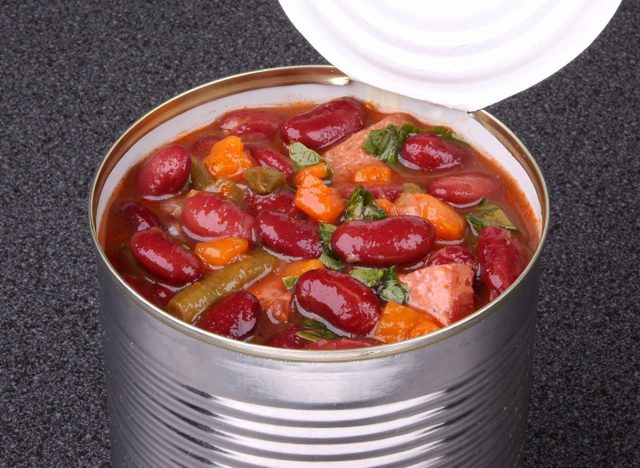What Happens to Your Body When You Eat Canned Soup

Soup may be one of the coziest meals you can make for yourself. And while there are plenty of one-pot or slow cooker recipes that make cooking soup a bit easier, sometimes you just want to be able to press a button on the microwave and have your dinner prepared. That’s where canned soups come in handy.
The convenience of canned soups enhances their appeal in more ways than one. Not only are they quick and easy to make, but canned soups are also generally super affordable, too. Unfortunately, there is a catch: Many canned soup products tend to fall on the “unhealthier” side of the healthy-eating spectrum, due to the large amounts of sodium, preservatives, and added sugars they can contain.
But what exactly does happen to your body when you eat canned soup? We asked dietitians to find out. And if you’re looking for some healthier canned soup options, make sure to check out 7 Canned Soups With the Highest Quality Ingredients.
You might feel full faster

According to Amy Goodson, MS, RD, CSSD, LD, author of The Sports Nutrition Playbook, and member of our expert medical board, canned soup may help satiate your appetite sooner.
“Canned soup can often help people feel full due to its liquid content, and fluids often help you to manage your portion sizes at meals,” Goodson says. “This is especially true if you add extra vegetables to your canned soup.”
“Truth be told, you may not be full for long—but in the moment, canned soup might help fill you up,” Goodson continues.
However, if you happen to pick up a lighter can of soup, try bulking it up by adding more meat, beans, or lentils to sustain feelings fullness long after eating. Additionally, you can add a vegetable-heavy side salad to go along with your meal.
You might be more hydrated
This one may surprise you, but canned soup can actually help hydrate you.
“Many exercisers skimp on hydration in the cooler months because they don’t want to drink cold fluids when training, or they just don’t think they need to because they are not sweating as much,” says Goodson. “But the truth is, you still need to replace fluids and electrolytes if you train heavy and intensely. The great news is that canned soup can help!”
Canned soup—or soup of any kind—should, of course, never replace your water consumption. However, as Goodson explains that “soup’s warm fluid and added sodium content can help warm you up and hydrate you after a chilly outdoor workout in the fall and winter months.”
It may raise your blood pressure
While a mild amount of sodium (around 500 milligrams) is necessary for certain nerve and muscle functions, consuming too much sodium may have detrimental effects on your blood pressure.
“Most Americans consume too much sodium from fast food, packaged foods, and processed snacks—and canned soups are often right up there in sodium content,” says Goodson. “The challenge is that regularly consuming more sodium than the maximum recommended value—no more than 2,300 milligrams per day—can contribute to a potential increase in blood pressure over time.”
It may contribute to inflammation

Along with sodium, it’s important to take note of how much added sugar or refined carbohydrates may be lurking in your canned soup.
“Many canned soups are made with low-quality pastas from refined carbohydrates, and some of the sweeter, creamier soups have added sugars as well,” says Trista Best, MPH, RD, who is a registered dietitian at Balance One Supplements.
Added sugar and refined carbohydrates—which include things like white bread, white flour, and pasta made with processed flours—in small amounts are not necessarily problematic. However, concerns arise when sugar and refined carbs consumed in larger quantities on a regular basis.
“Both ingredients may be highly inflammatory and can lead to poor gut health and weight gain,” says Best.
You may retain water
As mentioned above, many types of canned soups are high in sodium, which may lead to things like high blood pressure.
“Even if you have a lower calorie canned soup, the excessive sodium in soups may lead to fluid retention and bloating, which can lead to a lot of physical discomfort,” says Lisa Young, PhD, RDN, author of Finally Full, Finally Slim, and member of our medical expert advisory board.
Canned soup can be a great way to save yourself the effort, time, and money. Yet at the same time, some canned soup varieties are loaded with sodium, added sugar, and refined carbs, making these a not-so-ideal choice. If you are still craving soup and want to grab a quick can, just look for options with lower levels of sodium and ones that are full of plenty of vegetables.









